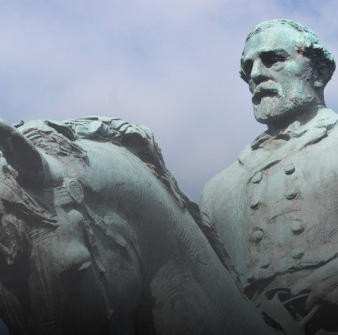While most Americans watch helplessly, our stateside Taliban vandalizes and removes long-standing public monuments. As some commentators point out, the destruction weakens our consciousness of history, including history’s darker side.
Even more importantly, however, erasing monuments of once-revered figures upsets an unspoken but long-prevailing consensus governing our decisions of whom to commemorate. The consensus renders the commemoration process more meaningful and less political than it otherwise would be.
The standard traditionally applied is as follows: When deciding whom to commemorate — by statues, place names, monuments, holidays, currency, or coins — we select individuals who performed extraordinary feats that, on balance, made the world a better place. We disregard or discount those faults common to the individual’s time and place. We do not erect monuments to people who performed extraordinary feats that were unquestionably evil, even if their characters included some virtuous traits. Thus, George Washington is memorialized in statues and place names, although he held slaves. Adolph Hitler gets none, although he was kind to dogs.
George Washington is one example of the traditional standard in action. Other examples are the decisions to name towns in New York State, Illinois, and Indiana after the Roman consul, Marcus Tullius Cicero. Cicero was a great orator, an outstanding lawyer, a spokesman for balanced government, and the single person most responsible for transmitting the Greek philosophical tradition to Western Europe. It does not disqualify him that he selected a husband for his daughter rather than allowing her to select one for herself. Parental selection of spouses is anathema today, but in Cicero’s society, “everybody did it.”
Stupendous vision, energy, competence, and courage distinguished Christopher Columbus from others of his generation. His explorations united a world previously divided by hemispheres. His disreputable actions reflected attitudes and practices common to his society. Thus, we honor Columbus by monuments, place names, and a federal holiday.
Robert E. Lee has become a target among those seeking to obviate history allegedly because he held slaves and fought for his home state rather than the nation. But so did tens of thousands of others similarly situated. Lee was distinguished from his contemporaries by an exemplary career, both in the U.S. and Confederate armies, of competence and honor. In later years, Lee also distinguished himself as an educator: As president of the institution that is now Washington and Lee University, he was largely responsible for fashioning the modern college honor code.
There are at least two reasons for not permitting contemporaneous vices to disqualify historical figures from favorable commemoration. First, virtually everyone acts in ways consistent with contemporaneous social norms—norms of which later generations may disapprove. Common faults are, by definition, common. If we disqualified all figures because we now reject their society’s practices, we would commemorate few people indeed, and we would deprive ourselves of many sources of inspiration.
Second, because almost everyone conforms in most respects to prevailing social practices, disqualification for such conduct is necessarily arbitrary and driven more by politics than by merit. The fact that a particular vice prevailed in a person’s place and time becomes an excuse for stripping recognition from people whose lives contradict the propaganda of those in power. Today “progressives” vandalize statues of Columbus and Lee, allegedly because of actions motivated by racism. Tomorrow, a “white nationalist” majority might uproot monuments to Martin Luther King citing his adulteries and other indiscretions. Or a religiously-conservative majority may blacklist outstanding women who in private life opted for legal abortions.
Admittedly, the traditional consensus is not an infallible guide to deciding whom to commemorate. For one thing, it can be a close question whether a person’s extraordinary feats made the world a better place: Franklin D. Roosevelt is widely commemorated, even though scholars still argue over whether his leadership during the Great Depression actually improved American life. Politics plays a role in answering close questions.
In some cases, moreover, politics induces decision makers to ignore the traditional standards. It is hard to explain on other than political grounds why so many more monuments and places are dedicated to John F. Kennedy than to much better presidents.
But the traditional standard does help minimize political manipulation of history. Perhaps that is precisely why the standard is flouted by those who want to politicize everything.
This article originally appeared in The Hill on September 20, 2017.








